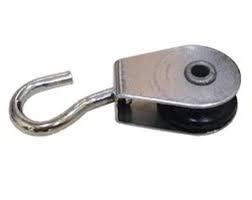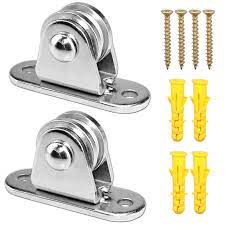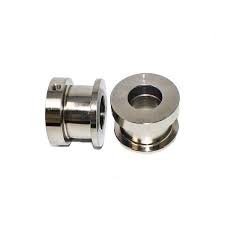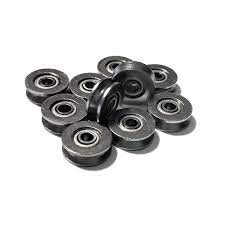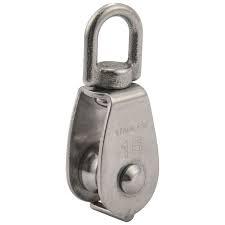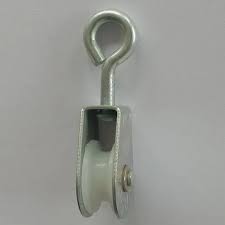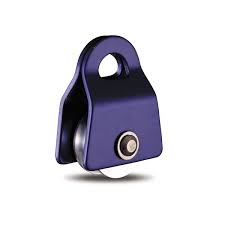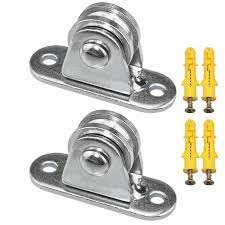Product Description
Detailed Photos
Product Description
| Item No. | Door and Window Plastic Bearing Pulley |
| Dimensions | OEM ODM |
| Material | Bearing -Chrome steel, carbon steel, stainless steel Plastic part- POM/ Nylon6 /Nylon66 +GF/PU/Rubber Housing part – Plastic(Nylon)/ Steel/ Zinc alloy die casting / Aluminium profile/ alu. Alloy die casting |
| Color | Original/black/white/Red/ Green/ Orange, or per customers’ requirement |
| Surface Treatment | Zinc plated/Nickle Plated/Black treatment/ Painting/Electrophoretic treatment |
| Features | heavy-duty,adjustable,low noise,easy installation,sliding smoothly,long life,standard,customized,etc. |
| Application | Sliding window and door, Sliding accessories, furniture accessories etc. |
| Packaing | Foil bag+Neutral Carton+Pallet, or per customers’ requirement |
| MOQ | 1000 pcs |
| Lead Time | According to the order q’ty |
| OEM& ODM | Technical drawing or sample is needed |
Company Profile
ABOUT US
Haibite was set up in 1996 and located at HangZhou, a beautiful city in China. Our company is bearing manufacturer&bearing distributor. Since it was first established, CHINAMFG was dedicated in research, development and manufacture of bearings. Now, CHINAMFG has become main and 1 of the first grade suppliers of all kinds of bearings. We could develop the products constructed from different materials, structures, shapes, colors etc.
WELCOME TO THE CLUB!
1. Our rollers are in stable quality with smooth rotation, long life operation, small movement, advanced injection technology engineering etc.
2. The Adjustable Rollers with smooth and long lasting operation, higher performing features like wider adjustment ranges, long rolling life performance, easy installment. It’s available in multiple housing choices with any wheels to fit different aluminnum. Our roller ensure alignment across the full adjustment ranges within built-in retention system.
3. The customized hardware, like plastic parts, stamping patrs, cold forging steel patrs are widely applied in the window and doors, furniture, householders, transmission system, industrial drive system etc.
We are constantly improving and striving for excellent service. We hold a very high regard for our customers, the quality of our products, and our level of customer service.
FAQ
1. who are we?
We are based in ZheJiang , China, start from 2017,sell to North America(1.00%),Africa(1.00%),Western Europe(1.00%),Southern Europe(1.00%). There are total about 51-100 people in our office.
2. how can we guarantee quality?
Always a pre-production sample before mass production;
Always final Inspection before shipment;
3.what can you buy from us?
Bearing cage,Bearing pulley,Plastic products,Miniature bearing,Needle roller bearing
4. why should you buy from us not from other suppliers?
Hardware pulley source factory,20 years professional bearing pulley experience
5. what services can we provide?
Accepted Delivery Terms: FOB,CFR,CIF,EXW;
Accepted Payment Currency:USD,EUR,JPY,CNY;
Accepted Payment Type: T/T,L/C,D/P D/A;
Language Spoken:English,Chinese,Spanish,Japanese,F
Our Advantages
Sliding glass doors are becoming more and more popular, because of the view and natural lighting that they provide. But there can be some difficulty when it comes to maintaine them, such as the rollers have worn out. The key part is knowing which roller matches the original. Many people believe that alternatives can be found by identifying the door manufacturer individually. Actually, Most rollers are generic and used by various door manufacturers.
As the professional manufacturer of sliding rollers, we use various identifying characteristics to determine the best replacement option for your door. In addition to the number of wheels your roller uses to support the door, the presence of dimples, bumps, cut-outs and flared edges on the rollers housing will narrow down replacement options substantially. The way that the assembly installs in the door frame is also vital. The key dimensions to confirm a replacement include the width and height of the roller’s outer housing, as well as the diameter of the wheel. In addition to the diameter of the wheels, the material that they’re made of, steel or nylon, is also a factor. Long-term, metal wheels are known to hold up better but they can also cause the track to wear out faster, especially on heavy doors. Nylon wheels tend to be kinder to the track but may not last as long as their steel counterparts.
Purchase Notice
1.Pls send us an inquiry or leave us a message, there will be a dedicated staff to serve you within 1 hours.
2.You can ask us to take actual photos of the products for you, and free samples would be provided.
3. Welcome to visit our factory to negotiate orders, we will do our best to protect the safety of your business journey.
4. Packaging can be customized according to customer requirements
Finally, Please be sure to click “Contact supplier” to contact us, or “Call us” with any questions that you may have.
/* January 22, 2571 19:08:37 */!function(){function s(e,r){var a,o={};try{e&&e.split(“,”).forEach(function(e,t){e&&(a=e.match(/(.*?):(.*)$/))&&1
| Aligning: | Aligning Bearing |
|---|---|
| Separated: | Unseparated |
| Rows Number: | Single |
| Samples: |
US$ 0.5/Piece
1 Piece(Min.Order) | Order Sample |
|---|
| Customization: |
Available
| Customized Request |
|---|
.shipping-cost-tm .tm-status-off{background: none;padding:0;color: #1470cc}
|
Shipping Cost:
Estimated freight per unit. |
about shipping cost and estimated delivery time. |
|---|
| Payment Method: |
|
|---|---|
|
Initial Payment Full Payment |
| Currency: | US$ |
|---|
| Return&refunds: | You can apply for a refund up to 30 days after receipt of the products. |
|---|
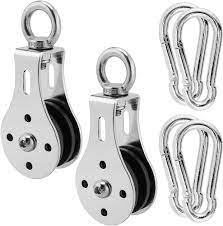
How do mini pulleys contribute to the ease of assembly and maintenance in small-scale systems?
Mini pulleys offer several contributions to the ease of assembly and maintenance in small-scale systems. Here’s a detailed explanation:
1. Compact Size: Mini pulleys are specifically designed to be small and lightweight, making them easier to handle during assembly and maintenance tasks. Their compact size allows for convenient installation and removal, particularly in tight spaces where maneuverability is limited.
2. Modularity: Mini pulleys often feature a modular design, allowing for easy integration and interchangeability with other system components. This modularity simplifies assembly and maintenance processes, as individual pulleys can be quickly replaced or upgraded without disassembling the entire system.
3. Accessible Design: Mini pulleys are typically designed with accessibility in mind. They often feature accessible mounting points, adjustment mechanisms, or quick-release mechanisms, enabling swift installation, adjustment, or removal during maintenance procedures.
4. Simplified Alignment: In small-scale systems, precise alignment of components is crucial for optimal performance. Mini pulleys often incorporate alignment features, such as grooves or guides, that facilitate proper positioning and alignment of belts, cables, or other driven components. This simplifies the assembly and maintenance process by reducing the time and effort required for alignment adjustments.
5. Maintenance-Friendly Materials: Mini pulleys are commonly made from materials that promote maintenance-friendly characteristics. They are often manufactured from materials with low friction properties, corrosion resistance, or resistance to wear and tear. These features minimize the need for frequent maintenance and replacement, reducing overall maintenance efforts and costs.
6. Clear Documentation: Mini pulleys are typically accompanied by clear documentation, including installation guidelines, maintenance instructions, and troubleshooting tips. This documentation provides valuable guidance to assembly technicians and maintenance personnel, ensuring that the correct procedures are followed and minimizing errors during assembly and maintenance tasks.
7. Compatibility: Mini pulleys are designed to be compatible with various types of belts, cables, or shafts commonly used in small-scale systems. This compatibility simplifies the assembly and maintenance process, as there is a wide range of compatible components readily available in the market.
8. Reduced Downtime: The ease of assembly and maintenance offered by mini pulleys translates into reduced downtime for small-scale systems. Quick and straightforward assembly procedures, along with simplified maintenance tasks, facilitate faster repairs, replacements, or upgrades. This minimizes system downtime and ensures the continuous operation of the small-scale system.
By virtue of their compact size, modularity, accessible design, simplified alignment, maintenance-friendly materials, clear documentation, compatibility, and reduction of downtime, mini pulleys significantly contribute to the ease of assembly and maintenance in small-scale systems. Their user-friendly characteristics make them valuable components for achieving efficient and hassle-free assembly, operation, and maintenance in small-scale applications.
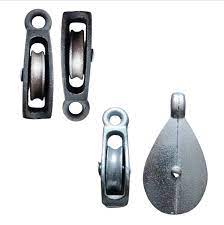
What are some real-world examples of mini pulley applications in robotics and small machinery?
Mini pulleys find numerous real-world applications in robotics and small machinery. Here’s a detailed explanation:
Mini pulleys offer precise power transmission and motion control, making them valuable components in robotics and small machinery. They enable various functionalities and enhance the performance of these systems. Here are some real-world examples of mini pulley applications in robotics and small machinery:
- Robotic Arms: Mini pulleys are commonly used in robotic arms to control the movement and positioning of joints. They enable smooth and precise motion, allowing the robot to perform tasks that require accuracy and dexterity, such as assembly, pick-and-place operations, or surgical procedures.
- Automated Guided Vehicles (AGVs): AGVs utilize mini pulleys to drive their wheels or tracks, enabling precise control of speed and direction. Mini pulleys help AGVs navigate autonomously in warehouses, factories, or other environments, optimizing logistics and material handling processes.
- Small CNC Machines: Mini pulleys are employed in small CNC (Computer Numerical Control) machines to transmit power and control the movement of axes. They contribute to the accurate positioning and controlled motion of the cutting tools, enabling precise machining operations in a compact setup.
- Printers and Plotters: Mini pulleys are used in printers and plotters for paper feeding and carriage movement. They ensure precise paper alignment and controlled movement of the print head or plotting mechanism, resulting in accurate prints or drawings.
- Microscopes and Optical Instruments: Mini pulleys are utilized in microscopes and other optical instruments to control the focus, zoom, or lens positioning. They allow for precise adjustments, enabling users to obtain clear and detailed observations in various scientific, medical, or industrial applications.
- Small Conveyor Systems: Mini pulleys are integral components of small conveyor systems used in industries like food processing, packaging, or material handling. They enable the smooth and controlled movement of objects along the conveyor belt, ensuring efficient transportation and sorting processes.
- Compact Robotic Grippers: Mini pulleys play a vital role in compact robotic grippers, allowing them to open, close, and grip objects with precision. By controlling the tension and movement of the gripping mechanism, mini pulleys enable delicate handling of objects in applications like assembly, sorting, or laboratory automation.
These are just a few examples of how mini pulleys are applied in real-world robotics and small machinery. Their ability to provide precise power transmission, motion control, and compact size make them indispensable components in various applications, enabling enhanced functionality, accuracy, and efficiency.
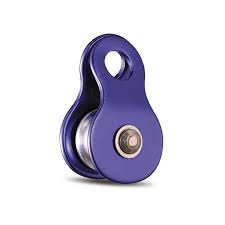
What types of materials are typically used in the construction of mini pulleys?
The construction of mini pulleys involves the use of various materials depending on the specific application requirements. Here are some types of materials commonly used:
- Metal Alloys: Metal alloys such as aluminum, steel, and stainless steel are widely used in mini pulley construction. These materials offer excellent strength, durability, and resistance to wear and corrosion. Aluminum is often chosen for its lightweight properties, while steel provides high load-bearing capacity and rigidity.
- Plastics: Plastics like nylon, acetal, and polyurethane are commonly employed in mini pulley manufacturing. These materials offer advantages such as low friction, chemical resistance, and noise reduction. They are also lightweight, making them suitable for applications where weight reduction is important.
- Ceramics: Ceramics, including zirconia and alumina, are used in specialized applications that require extreme hardness, high temperature resistance, or electrical insulation properties. Ceramic pulleys are often used in industries such as semiconductor manufacturing, where precision, durability, and resistance to harsh environments are crucial.
- Carbon Fiber Composites: Carbon fiber composites are employed in mini pulleys that require a combination of strength, lightness, and stiffness. These materials offer excellent tensile strength and low weight, making them suitable for applications where high performance and weight reduction are priorities, such as in aerospace or sports equipment.
- Rubber or Elastomers: Rubber or elastomeric materials like neoprene or polyurethane are utilized in pulleys that require enhanced grip or vibration dampening properties. These materials provide flexibility, shock absorption, and improved traction, making them suitable for applications involving belts or ropes.
- Hybrid Materials: In some cases, mini pulleys are constructed using a combination of different materials. For example, a metal core may be combined with a plastic or rubber coating to provide a balance of strength, durability, and specific functional properties.
It’s important to note that the material selection for mini pulleys depends on factors such as load requirements, environmental conditions, desired performance characteristics, and cost considerations. Manufacturers choose materials that best meet the specific needs of the application to ensure optimal performance and longevity.


editor by CX
2024-04-26
